The Cars: The Elektra Years 1978-1987

It was the height of disco, the era of Saturday Night Fever and other mega blockbuster film and soundtrack tie-ins like Grease. Yet somehow the Cars managed to gain a toe hold on the charts with their stark, cynical new wave power pop, cracking open the Top 40 with a self-titled debut album that was replete with numbers like “You’re All I’ve Got Tonight”—a love song to an abuser.
The Cars is rightly seen as one of the classic debut albums of all time (the kind of record where it sounds like every track could’ve been released as a single), and it heads up the new box set The Elektra Years 1978-1987, which features the six Cars albums with the original lineup (Benjamin Orr, bassist and one of the group’s two lead singers, died in 2000). It’s certainly the critical favorite of all the band’s albums, though the Cars enjoyed more commercial success with their later work.
Such as Candy-O, released in 1979, which quickly landed in the Top 3 and went platinum in just two months. It’s like a tamer version of The Cars, the same clinical coolness (unsurprising, since both albums were produced by Roy Thomas Baker), but lacking the spiky edge of its predecessor. Panorama (1980) is punchier in places, being kicked off by the delightfully swirling title track, which spins on for over five and a half minutes. There’s also a more pronounced darkness, due to the doomier cast of the music; it was easier to overlook the band’s generally pessimistic lyrics when the music was more upbeat.
-

-

-

-

-

-

-

-

-

-

-

-

-

-

-

-

-

-

-

-

-

-

-

-

-

-

-

-

-

-

-

-

-

-

-

-

-

-

-

-








































